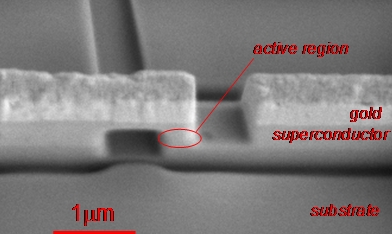Home > Press > Large Current to Flow with Zero Resistance
 |
Abstract:
How can one increase the maximum current which can flow in a superconductor without any resistance? Counter-intuitively the answer in some circumstances is to increase the dissipation (i.e. the energy losses) in the superconductor, as Paul Warburton and his colleagues from LCN and the University of Oxford show.
Large Current to Flow with Zero Resistance
London | Posted on January 26th, 2010Small currents can flow in superconductors with absolutely no resistance. This makes them important for a number of applications including hospital MRI scanners and energy-efficient power transmission. But above some value (known as the critical current) a phenomenon known as phase-slip causes a resistance to appear. Experiments on nanostructured thin films of the high-temperature superconductor thallium barium calcium copper oxide (TBCCO) conducted by Dr Warburton and his colleagues show that increasing the dissipation (or the viscosity) suppresses phase-slip, allowing larger currents to flow with zero resistance.
This is one example of how viscosity can prevent transitions (in the broadest sense of the word) from happening. In this case the transition is from the zero-resistance state of a superconductor to its resistive state. But both the natural and man-made worlds abound with examples of other types of transition where viscosity plays an important role. For instance, in the financial sector transitions between periods of steady growth of stock market prices and periods of wild fluctuations can be suppressed by "viscosity" in the form of market regulation.
Dr Warburton's work is reported in a recently-published paper in Physical Review Letters(1). His work is supported by the Engineering and Physical Sciences Research Council.
(1) prl.aps.org/pdf/PRL/v103/i21/e217002
####
About London Centre for Nanotechnology
The London Centre for Nanotechnology, LCN, is a UK based multidisciplinary enterprise operating at the forefront of science and technology. It is a joint venture between University College London and Imperial College London and is based at the Bloomsbury and South Kensington sites. It has a unique operating model that accesses and focusses the combined skills of the departments of chemistry, physics, materials, medicine, electrical and electronic engineering, mechanical engineering, chemical engineering, biochemical engineering and earth sciences across the two universities.
The Centre occupies a purpose-built eight storey facility in Gordon Street, Bloomsbury, as well as extensive facilities within different departments at South Kensington. LCN researchers have access to state-of-the-art clean-room, characterisation, fabrication, manipulation and design laboratories. This experimental research is complemented by leading edge modelling, visualisation and theory.
LCN has strong relationships with the broader nanotechnology and commercial communities, and is involved in many major collaborations. As the world's only such facility to be located in the heart of a metropolis LCN has superb access to corporate, investment and industrial partners. LCN is at the forefront of training in nanotechnology, and has a strong media presence aimed at educating the public and bringing transparency to this emerging science.
For more information, please click here
Contacts:
Bloomsbury (UCL) Site
London Centre for Nanotechnology
17-19 Gordon Street
London WC1H 0AH (click postcode for map)
tel: +44 (0)20 7679 0604
fax: +44 (0)20 7679 0595
Copyright © London Centre for Nanotechnology
If you have a comment, please Contact us.Issuers of news releases, not 7th Wave, Inc. or Nanotechnology Now, are solely responsible for the accuracy of the content.
| Related News Press |
Thin films
![]() Tiny nanosheets, big leap: A new sensor detects ethanol at ultra-low levels January 30th, 2026
Tiny nanosheets, big leap: A new sensor detects ethanol at ultra-low levels January 30th, 2026
News and information
![]() Decoding hydrogen‑bond network of electrolyte for cryogenic durable aqueous zinc‑ion batteries January 30th, 2026
Decoding hydrogen‑bond network of electrolyte for cryogenic durable aqueous zinc‑ion batteries January 30th, 2026
![]() COF scaffold membrane with gate‑lane nanostructure for efficient Li+/Mg2+ separation January 30th, 2026
COF scaffold membrane with gate‑lane nanostructure for efficient Li+/Mg2+ separation January 30th, 2026
Announcements
![]() Decoding hydrogen‑bond network of electrolyte for cryogenic durable aqueous zinc‑ion batteries January 30th, 2026
Decoding hydrogen‑bond network of electrolyte for cryogenic durable aqueous zinc‑ion batteries January 30th, 2026
![]() COF scaffold membrane with gate‑lane nanostructure for efficient Li+/Mg2+ separation January 30th, 2026
COF scaffold membrane with gate‑lane nanostructure for efficient Li+/Mg2+ separation January 30th, 2026
|
|
||
|
|
||
| The latest news from around the world, FREE | ||
|
|
||
|
|
||
| Premium Products | ||
|
|
||
|
Only the news you want to read!
Learn More |
||
|
|
||
|
Full-service, expert consulting
Learn More |
||
|
|
||








